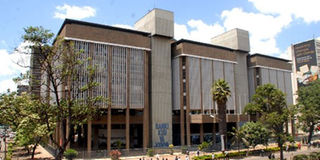Economy to grow by 6 per cent, says Moody's

The Central Bank of Kenya. Then growth outlook remains sensitive to weather shocks, particularly variability in rainfall, which affects agricultural output and electricity output and prices, the agency said.
What you need to know:
- Moreover, the outlook remains sensitive to weather shocks, particularly variability in rainfall, which affects agricultural output and electricity output and prices, the agency said.
Kenya's economic growth will be range-bound at 5 to 6 per cent in the period between 2013 to 2015, the global credit rating agency Moody's said on Friday.
Moody's which assigned Kenya a B1 sovereign rating in November 2012 said the country's growth outlook will be constrained by a weak public sector balance sheet.
"We expect growth to increase marginally to 5-6 per cent in 2013-15, boosted by elevated levels of investment," Moody's said in its June 14, 2013 report. Kenya's economy last year rose 4.7 per cent.
The 6 per cent growth is below the median of 6.1 per cent for B1 rated countries such as Ghana, Zambia, Senegal, Lebanon and Dominican Republic.
The agency said Kenya would grow by upto 10 per cent if it eliminated its chronic infrastructure deficit.
Limited economic diversification, a narrow export base and low per-capita income are some of the factors that are likely to check the country's growth outlook.
President Uhuru Kenyatta stayed on the expansionary path of his predecessor Mwai Kibaki submitting a Sh1.654 trillion budget for the next financial year.
The Treasury faces a budget deficit of Sh329 billion. Treasury revenue collections are estimated to be Sh1.27 trillion.
However, KRA only collected Sh707 billion last year in government revenues from taxes and other fees.
Kenya has a total debt of Sh1.8 trillion, with Sh800 billion borrowed in domestic debt and Sh1 trillion as external debt. Government officials however maintained that Kenya's debt is sustainable.
Moreover, the outlook remains sensitive to weather shocks, particularly variability in rainfall, which affects agricultural output and electricity output and prices, the agency said.
"Kenya’s institutional framework is a constraining factor to its B1 rating and exacerbates risks stemming from its volatile economic fundamentals," Moody's said its report.
The report sites Kenya's core institutional weaknesses as having a history of political instability (embedded in a social structure sharply divided along ethnic and tribal dimensions), a high incidence of corruption, which makes policy-making less transparent and predictable.
Most prominently, Kenya has begun a transition to a constitutionally-mandated, devolved system of government, with greater fiscal and policymaking autonomy granted to local county governments.
Rating agencies Moody's included were heavily criticised in 2008 for failing to give accurate information on the health of US financial institutions.




